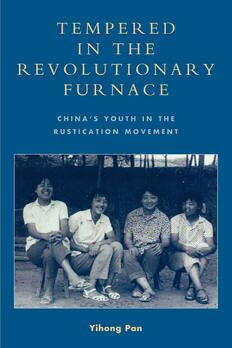
Tempered in the Revolutionary Furnace: China's Youth in the Rustication Movement PDF
Preview Tempered in the Revolutionary Furnace: China's Youth in the Rustication Movement
Tempered in the Revolutionary Furnace Tempered in the Revolutionary Furnace China's Youth in the Rustication Movement YIHONGPAN LEXINGTON BOOKS A division of ROWMAN & LITTLEFIELD PUBLISHERS, INC. Lanham Boulder· New York· Toronto Plymouth, UK • • LEXINGTON BOOKS A division of Rowman & Littlefield Publishers, Inc. A wholly owned subsidiary of The Rowman & Littlefield Publishing Group, Inc. 4501 Forbes Boulevard, Suite 200 Lanham, MD 20706 Estover Road Plymouth PL6 7PY United Kingdom Copyright © 2003 by Lexington Books First paperback edition 2009 All rights reserved. No part of this publication may be reproduced, stored in a retrieval system, or transmitted in any form or by any means, electronic, mechanical, photocopying, recording, or otherwise, without the prior permission of the publisher. British Library Cataloguing in Publication Information Available Library of Congress Cataloging-in-Publication Data Pan, Yihong, 1953- Tempered in the revolutionary furnace: China's youth in the rustication movement / YihongPan. p.cm. Includes bibliographical references and index. 1. Youth-China-History-20th century. 2. China-Rural conditions. 3. China History-1949- I. Title. HQ799.C5 P363 2003 305.26'0951-dc21 2002014805 ISBN: 978-0-7391-0433-0 (cloth: alk. paper) ISBN: 978-0-7391-4092-5 (pbk. : alk. paper) ISBN: 978-0-7391-4093-2 (electronic) Printed in the United States of America 8NT he paper used in this publication meets the minimum requirements of American National Standard for Information Sciences-Permanence of Paper for Printed Library Materials, ANSIINISO Z39.48-1992. Contents Abbreviations vii Explanatory Notes viii Acknow ledgments ix Table xi Introduction 1 Before the Countryside 9 2 Why Was There a Rustication Movement? An Examination of the Goals of the Government 35 3 Why Did I Go to the Countryside? 62 4 Life on the Army and State Farms 86 5 Life in Rural Villages 112 6 Tempered in the Revolutionary Furnace 138 7 Reeducation in the Vast Land 165 8 Love and Marriage 181 9 The "Back to the City Wind" 204 10 "We Want to Go Home;" "We Want Human Rights" 221 11 No Regrets for Our Youth? or Youth Sacrificed in Vain? 238 Epilogue 266 Bibliography 269 Index 279 About the Author 283 v Abbreviations BJRB, Beijing Ribao [Beijing ZGZQSD, Zhongguo Zhiqing Daily]. Shidian [Encyclopedia of China's Educated Youth] by HQ, Hong Qi [Red Flag]. Liu Xiaomeng, Ding Yi zhuang, Shi Weimin and He RMRB, Rinmin Ribao [People's Lan. Chengdu, Sichuan: Si Daily]. chuan Renmin Publishing House, 1995. ZGQNB, Zhongguo Qingnian Bao [China's Youth Daily]. ZGJYNJ, Zhongguo Jiaoyu Nianjian 1949-1981 [China's Yearbook of Education 1949- 1981] by Zhongguo Jiaoyu Nianjian Bianji Bu. Beijing: Zhongguo Da Baike Quanshu Publishing House, 1984. vii Explanatory Notes In Chinese, the word for the middle school graduates sent down to the country side is zhishi qingnian, or educated youth, often referred to in China by the ab breviation, zhiqing (pronounced "jerch'ing;" er as in her). I use zhiqing without italics throughout the book. Pinyin system is used for the Romanization of Chinese places and names, except Hsinghua and Peking Universities since this is how these universities re fer to themselves in English. Chinese names are written in the Chinese way: surname first and given name after it. Measurement conversions: 1 yuan = 100 fen 1 Ii = 0.5 kilometer = 1/3 mile 1 jin = 0.5 kilogram = 1.1 pounds 1 mu = 0.067 hectare = 116 acre viii Acknowledgments In offering this account of the experience of myself and my generation growing up in China during the Maoist era I need to thank the many people who gener ously helped to make the book possible. My heartfelt gratitudes go first of all to those who were willing to share with me their own experiences in the rustication movement, to Dr. Liu Xiaomeng, an ex-zhiqing and a historian, for his advice on sources, and generous sharing of ideas, to Qu Zhe for his reflective interview and agreement to use his name openly, to my zhiqing sister for her kind help in many ways, and to my friends, Sun Jingtao, Huang Ce, Zhang Jianxin, Lu Min, Wang Qiansheng, Zhang Tong, and Zhang Yaya, for their inspiration and their help in writing this book. The book is dedicated to them. It is also dedi cated to all those I interviewed. Because I have promised anonymity I cannot mention their individual names, but those long hours we shared in reflecting on the past experiences, their faces, and their voices remain with me. Their stories are in the book, which is our history. F or their consistent encouragement from the very beginning to tell the story of that past and to see the deeper meaning in it, I also owe great thanks to my dear friends Ted Pulleyblank, Eva Tai, and Teresa Yu. Thanks particularly to Ted, whose intellectual queries, scholarly vigor, and patience in careful reading of various versions of the manuscript persisted throughout the long process. Other academic colleagues have also been a source of unfailing support. lowe debts of gratitude to Michael O'Brien, Allan Winkler, Judith P. Zinsser, Laifong Leung, and Andrew Cayton for reading the manuscript at different stages, for their sharp and challenging questions and meticulous comments that made me explore deeper for answers, and searching clarity in thinking and writ ing. I also benefited greatly from many informal conversations with other col leagues at Miami University. Miami University pr,ovided me with academic leave in 1994-1995 and fi nancial support from the Hampton Fund and the fund for Small Research Grants that enabled me to travel to China, and to libraries in North America, for which I am much obliged. ix
